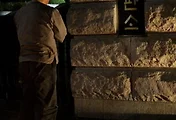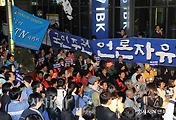'독설닷컴' 속보입니다.
국경없는기자회(RSF)에서 세계 언론 자유지수를 발표했습니다.
뱅상 브로셀 아시아-태평양 지국장(겸 대변인)이 아시아 태평양 지역 랭킹 결과를 바탕으로 글을 보내왔습니다.
한국은 지난해 47위에서 69위로 22위 하락했습니다.
파푸아 뉴기니(56위)보다 못하고 부탄(70위)보다 조금 낫습니다.
참고로 한국의 언론자유지수 순위는
2006년 31위에서 2007년 39위, 이명박 정부 출범 이후인 2008년엔 47위로
계속 하락하고 있습니다.
국경없는기자회는 한국의 언론자유지수가 낮아진 이유로
보수적인 정부가 비판 언론을 잠재우기 위해 블로거(미네르바))와 기자들(YTN노조 노종면 위원장)을 구속한 것을 꼽았습니다.
(곧 전문을 해석해서 올리겠습니다)

YTN 해직기자를 만나고 있는 뱅상 브로셀 국경없는기자회 아시아-태평양 지국장 겸 대변인
Reporters Without Borders/Reporters sans frontières
20 October 2009
WORLD PRESS FREEDOM RANKING
ASIA-PACIFIC
Authoritarianism prevents press freedom progress in much of Asia
Fiji falls furthest, but big advance by Maldives
Check your country ranking on: http://www.rsf.org/spip.php?page=article&id_article=34729
Political power grabs dealt press freedom a great disservice again this year. A military coup caused Fiji (152nd) to fall 73 places. Soldiers moved into Fijian news rooms for several weeks and censored articles before they were published, while foreign journalists were deported. In Thailand, the endless clashes between “yellow shirts” and “red shirts” had a very negative impact on the press’s ability to work. As a result, the kingdom is now 130th.
The authoritarianism of existing governments, for example in Sri Lanka (162nd) and Malaysia (131st), prevented journalists from properly covering sensitive subjects such as corruption or human rights abuses. The Sri Lankan government had a journalist sentenced to 20 years in prison and forced dozens of others to flee the country. In Malaysia, the interior ministry imposed censorship or self-censorship by threatening media with the withdrawal of their licence or threatening journalists with a spell in prison.
War and terrorism wrought havoc and exposed journalists to great danger. Afghanistan (149th) is sapped not only by Taliban violence and death threats, but also by unjustified arrests by the security forces. Despite having dynamic news media, Pakistan (159th) is crippled by murders of journalists and the aggressiveness of both the Taliban and sectors of the military. It shared (with Somalia) the world record for journalists killed during the period under review.
The Asian countries that least respected press freedom were, predictably, North Korea, one of the “infernal trio” at the bottom of the rankings, Burma, which still suffers from prior censorship and imprisonment, and Laos, an unchanging dictatorship where no privately-owned media are permitted.
The media in China (168th) are evolving rapidly along with the rest of the country but it continues to have a very poor ranking because of the frequency of imprisonment, especially in Tibet, Internet censorship and the nepotism of the central and provincial authorities. Similarly in Vietnam (166th), the ruling Communist Party targets journalists, bloggers and press freedom activists over what they write about its concessions to China.
In the good news section, Maldives (51st) climbed 53 places thanks to a successful democratic transition while Bhutan (70th) rose another four places thanks to further efforts in favour of media diversity.
Asia’s few democracies are well placed in the rankings. New Zealand (13th), Australia (16th) and Japan (17th) are all in the top 20. Respect for press freedom and the lack of targeted violence against journalists enable these three countries to be regional leaders.
South Korea (69th) and Taiwan (59th) fell far this year. South Korea plummeted 22 places because of the arrests of several journalists and bloggers and the conservative government’s attempts to control critical media. The new ruling party in Taiwan tried to interfere in state and privately-owned media while violence by certain activists further undermined press freedom.
Two Asian countries were included in the index for the first time: Papua New Guinea (56th), which obtained a very respectable ranking for a developing country, and the Sultanate of Brunei (155th), which came in the bottom third because of the absence of an independent press.
주> 다음은 한국 관련 부분입니다.
cyberdissidents imprisoned .Police and the prosecutor’s office no longer hesitate to arrest journalists because of their reports. The prosecutor’s office harassed a team from public MBC television whose report on risks from imported Asian beef gave rise to major anti-government protests, holding one reporter for two days and making several attempts to search its premises.
Journalists and media workers’ unions reacted robustly in the face of “interventions” compromising their editorial independence. One particularly tough dispute took place at YTN television whose president was challenged for being close to the head of state. As a result four journalists were arrested and 20 others were sanctioned while a satirical news programme was taken off air.
South Korea is despite all this one of the very few Asian countries where there is real news pluralism. Although President Lee Myung-bak can rely on the support of the country’s three leading dailies which are conservative in outlook, there are also independent and pro-opposition media and large numbers of online publications.
South Korea, a country at the cutting edge of new technology and which has very active “Netizens” (Citizen Internet users), has been placed on Reporters Without Borders’ list of ‘countries under surveillance’. The government has in fact put in place the means to scrutinise online news content. Scores of Internet users, including the renowned blogger Minerva, have been arrested following complaints from the government or by individuals. Minerva, under his real name of Park Dae-sung, has been in prison since 7 January 2009, on the grounds that he affected “foreign exchange markets” and the “nation’s credibility” through his posts on the financial crisis in a discussion forum.
Under the national security law that bans all contact with North Korea, it is still impossible to view Pyongyang media and to publish any comments favourable to the Kim Jong-il regime.
'위기의 기자들, PD들' 카테고리의 다른 글
| 언론인 최상재, 헌법재판소 앞에서 쓰러지다 (화보) (20) | 2009.10.29 |
|---|---|
| 언론인 최상재, 헌법재판소 앞에서 쓰러지다 (9) | 2009.10.27 |
| 탄압받는 언론인이 한 자리에 모입니다 (12) | 2009.10.20 |
| MB 때문에 '개고생' 하고 있는 언론인 리스트입니다 (35) | 2009.06.19 |
| 기자와 PD의 아내가 겪고 있는 일입니다 (6) | 2009.05.02 |


